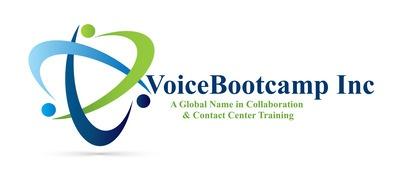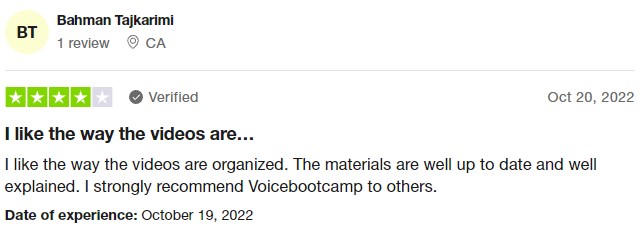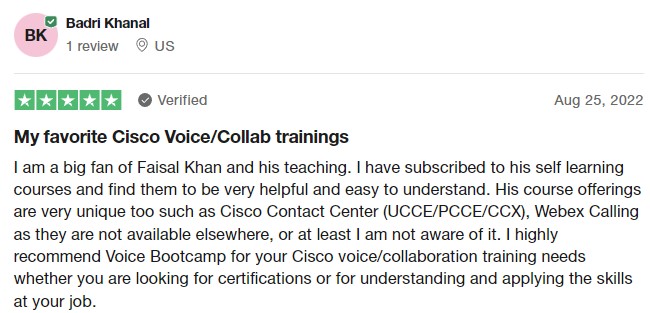Tel: 1-866-777-0060 | Request For Information
Cisco CCIE Collaboration 3.1 Self Study Kit
CCIE Collaboration Self-Study Kit is designed to help you prepare for the CCIE Collaboration lab Exam from beginning to end. This kit is designed for the beginner, intermediate, or even expert level engineer who wants to pass CCIE Collab lab on the 1st or 2nd attempt.
What is included?
- CCNP/CCIE Collaboration Video Lectures
- CCIE Collaboration 3.1 Workbook with Lab & Solutions
- Cisco WebEx Calling Professional Training Video
- Cisco WebEx Contact Center Training Video
- 200 Hours of Lab Access - standard lab
Price $1,299 USD
Buy Platinum Package &
Attend CCIE Collaboration 3.1 Bootcamp for FREE (value of $4,495)
Offer valid Until April 30, 2024
Buy Today & Reserve Your Free Course (Save $2,500)
Content Outline
Implementing Cisco Collaboration Core Technologies - CLCOR 350-801
- Chapter 1.1 - Cisco Collaboration Solutions Architecture - Overview
- Chapter 1.2 - Cisco Collaboration Solutions Architecture - Deployment and Licenses
- Chapter 1.3 - Cisco Collaboration Solutions Architecture - High Availability and Redundancy
- Chapter 1.4 - Cisco Collaboration Solutions Architecture - Certificates
- Chapter 1.5 - Cisco Collaboration Solutions Architecture - Disaster Recovery and Backup
- Chapter 1.6 - Cisco Collaboration Solutions Architecture - IP Network Protocols
- Chapter 1.7 - Cisco Collaboration Solutions Architecture - Overview of Codecs
- Chapter 2.1 - Exploring Call Signaling over IP Network - Phone Bootup and On Cluster Call
- Chapter 2.2 - Exploring Call Signaling over IP Network - Phone Initialization and SIP Signals
- Chapter 3.1 - Integrating Cisco Unified Communications Manager LDAP - Overview
- Chapter 3.2 - Integrating Cisco Unified Communications Manager LDAP - Synchronization and Authentication
- Chapter 3.3 - Integrating Cisco Unified Communications Manager LDAP - Access Control Grup
- Chapter 3.4 - Integrating Cisco Unified Communications Manager LDAP - Feature Group Template
- Chapter 4.1 - Implementing Cisco Unified Communications Manager Provisioning Features - Manual and Auto Registration
- Chapter 4.2 - Implementing Cisco Unified Communications Manager Provisioning Features - Bulk Administration Tools
- Chapter 4.3 - Implementing Cisco Unified Communications Manager Provisioning Features - Self Provision Part 1
- Chapter 5.0 - Exploring Codecs
- Chapter 6.1 - Describing Dial Plans and Endpoint Addressing - Overview
- Chapter 6.2 - Describing Dial Plans and Endpoint Addressing - Endpoint Addressing
- Chapter 6.3 - Describing Dial Plans and Endpoint Addressing - Call Routing Process and Logic
- Chapter 6.4 - Describing Dial Plans and Endpoint Addressing - Addressing Method
- Chapter 6.5 - Describing Dial Plans and Endpoint Addressing - Variable Length Dialing and Urgent Priority
- Chapter 7.0 - Implementing MGCP Gateways
- Chapter 8.0 - Implementing Voice Gateways
- Chapter 9.0 - Configuring Calling Privileges in Cisco Unified Communications Manager
- Chapter 10 - Implementing Toll Fraud Prevention
- Chapter 11 - Implementing and Troubleshooting Media Resources in Cisco Unified Communications Manager Part 1
- Chapter 11 - Implementing and Troubleshooting Media Resources in Cisco Unified Communications Manager Part 2
- Chapter 11 - Implementing and Troubleshooting Media Resources in Cisco Unified Communications Manager Part 3
- Chapter 11 - Implementing and Troubleshooting Media Resources in Cisco Unified Communications Manager Part 4
- Chapter 12 - Describing Cisco Instant Messaging and Presence
- Chapter 13 - Enabling Cisco Jabber in Cisco Unified IM and Presence
- Chapter 14 - Configuring Cisco Unity Connection Integration
- Chapter 15 - Configuring Cisco Unity Connection Call Handlers
- Chapter 16 - Describing Collaboration Edge Architecture - Part 1 - Lab
- Chapter 16 - Describing Collaboration Edge Architecture - Part 1 - Lecture
- Chapter 17 - Analyzing Quality Issues in Converged Networks
- Chapter 18 - Defining QoS and QoS Models - Part 1
- Chapter 18 - Defining QoS and QoS Models - Part 2
Implementing Cisco Collaboration Applications (CLICA 300-810)
Implementing Cisco Collaboration Conferencing (CLCNF)
Cisco WebEx Calling Professional Study Kits
Cisco WebEx Contact Center Study kits




